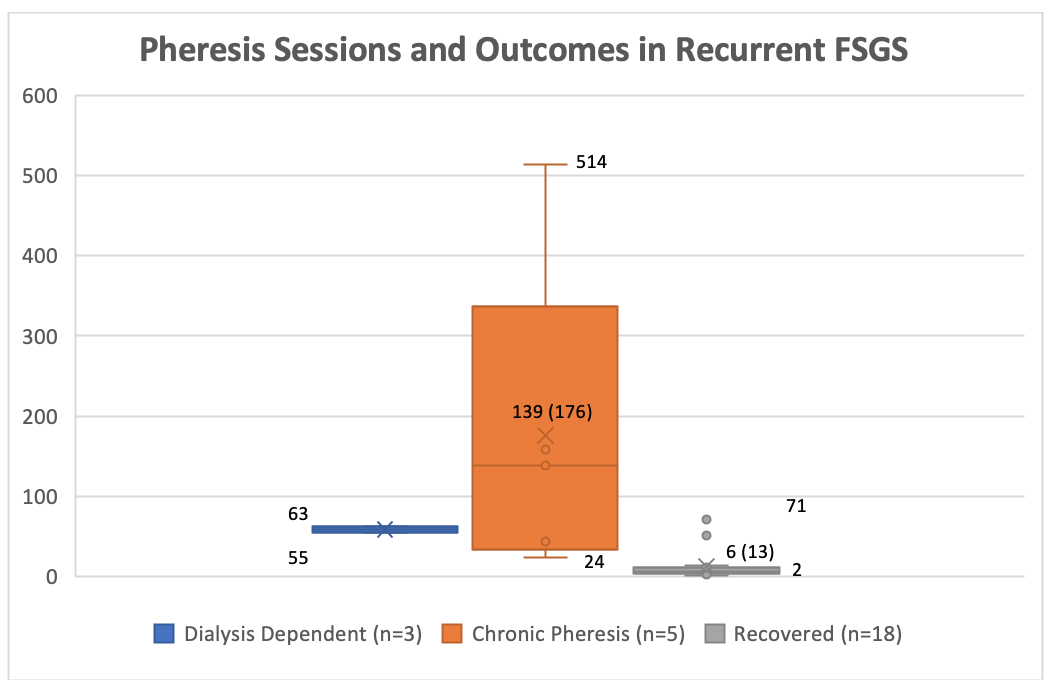Recurrent Focal Segmental Glomerulosclerosis and the Possibility of Re-Transplantation
1Urology, UCLA, Los Angeles, CA, 2Nephrology, UCLA, Los Angeles, CA
Meeting: 2020 American Transplant Congress
Abstract number: LB-008
Keywords: Graft failure, Kidney transplantation, Recurrence, Retransplantation
Session Information
Session Name: Poster Session A: Late Breaking
Session Type: Poster Session
Date: Saturday, May 30, 2020
Session Time: 3:15pm-4:00pm
 Presentation Time: 3:30pm-4:00pm
Presentation Time: 3:30pm-4:00pm
Location: Virtual
*Purpose: Up to 30% of patients with focal segmental glomerulosclerosis (FSGS) experience recurrent disease after renal transplant, with high rates of progression to allograft failure (84% at 3 years). Case studies have demonstrated reversibility of the disease following re-transplantation. The aim of this study was to explore outcomes of patients with recurrent FSGS post-transplant at UCLA.
*Methods: A retrospective chart review was conducted. Between 1/2014 and 8/2019, 1860 kidney transplantations were performed, 100 of which were due to biopsy-proven FSGS. Patients were considered to have recurrent disease if they received treatment based on a rising urine protein to creatinine ratio and/or had biopsy-proven recurrence. Descriptive and comparative statistics were obtained, with analysis completed in R 3.6.1.
*Results: Twenty-six recipients experienced FSGS recurrence. Patients with recurrence were younger (34.3 vs. 44.8, p=0.003) and more likely to have a history of native nephrectomy (7 vs. 2, p=0.003). Gender, race/ethnicity, Charlson comorbidity index, BMI, distribution of transplant type (living versus deceased or en bloc transplants) and rates of rejection were similar between the recurrence and non-recurrence groups. Most patients received plasmapheresis (n=23) with or without rituximab for treatment (n=11) which allowed for complete recovery in 18 patients (69%). Because of disease recurrence, 3 patients returned to dialysis (one of whom elected allograft nephrectomy and re-transplantation on post-op day 5) and 5 are chronically pheresis-dependent. Those experiencing a durable recovery required a median of 6 pheresis sessions (range 2-71, see graph).
*Conclusions: Most patients with recurrent FSGS experience complete recovery with early plasmapheresis, usually within 6 pheresis sessions. There may be a point of diminishing return in the management of recurrent FSGS in which additional pheresis fails to prevent graft failure and may open the possibility of re-transplantation to prevent early graft loss.
To cite this abstract in AMA style:
Wood EL, Burrows J, Lum E, Veale J. Recurrent Focal Segmental Glomerulosclerosis and the Possibility of Re-Transplantation [abstract]. Am J Transplant. 2020; 20 (suppl 3). https://atcmeetingabstracts.com/abstract/recurrent-focal-segmental-glomerulosclerosis-and-the-possibility-of-re-transplantation/. Accessed March 4, 2026.« Back to 2020 American Transplant Congress

